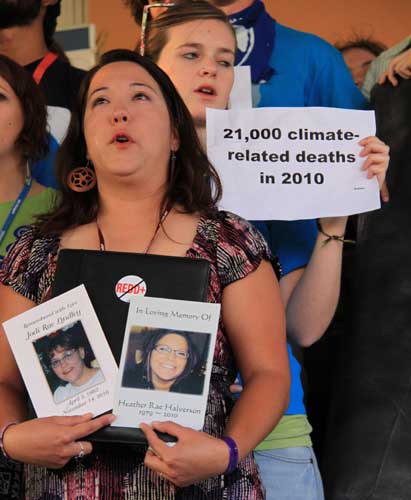-
News >World
Cancun lays foundation
2010-12-13 07:59
Members of youth organizations at the Cancun conference hold photos of their loved ones lost in extreme weather disasters on Dec 13. [Dong Wei / China Daily]
Cancun a big step toward 'value and confidence of multilateralism'
CANCUN, Mexico - Negotiators from 193 countries have wrapped up a package of agreements that advances efforts to cope with climate change and lays a foundation for talks leading to the next conference in Durban, South Africa, in December next year.
Despite an objection from Bolivia, delegates approved the package in the wee hours of Saturday morning after nearly two days of round-the-clock negotiations. Su Wei, China's top negotiator, lost his voice.
Claudia Salerno Caldera, Venezuela's chief negotiator, said the talks were even filled with "tears and fury".
Although it is still "not a perfect package" - as many delegates said - steps have been taken at various levels in key issues such as adaptation, finance, technology transfer and capacity building.
Delegates applauded the Mexican Foreign Minister Patricia Espinosa for the efforts to ensure a balanced outcome. Most delegates agreed the talks were transparent and inclusive.
Cancun has taken a big step in convincing the international community of the value and confidence of multilateralism, said heads of delegations, including China's top climate change official Xie Zhenhua.
The decision reflects the views of all countries and is satisfying, Xie said in a plenary meeting on the final day of the talks. However, ministers from many countries said the decision still leaves a lot to be desired.
"It still has its shortcomings and has yet to conclude the negotiations laid out by the Bali Road Map," Xie said, stressing the need for further implementation of the Kyoto Protocol and adherence to the Bali Road Map.
The process has been a rollercoaster ride for negotiators, due to the protocol becoming contentious.
On the conference's opening day, Japan expressed its unwillingness to commit itself to a second period of the protocol, with several other developed countries following. This sparked huge concerns for the fate of the protocol, especially from developing countries.
The outcome said all parties have agreed to ensure "there is no gap between the first and second commitment periods".
But observers say the language over the Kyoto Protocol is ambiguous. "(The document) said there shouldn't have (an) empty period between the first and second commitment periods, but it still fails to set a clear timetable for that," Stanley So, campaign manager for Oxfam Hong Kong, said.
The Chinese delegation said in a statement the conference "failed to conclude the negotiation of the Bali Road Map". This indicates that next year's negotiation task will be extremely difficult.
The progress that has been made, however, sends positive signals and will ensure next year's negotiation continues along the two tracks decided by the Bali Road Map, it said.
The delegation also reaffirms China's commitment to promoting green, low-carbon and sustainable development "so as to make our own contribution to the cause of combating climate change".
The Cancun agreement also set up a "Green Climate Fund" to assist poor nations - especially small island nations and the least developed ones, which are already suffering sea level rises and more floods and drought as temperatures steadily rise.
The fund will be steered by a board of 24 members chosen evenly from developed and developing nations, ensuring a strong voice for developing countries and financing delivered to those most vulnerable, Stanley So said.
Last year, the European Union, Japan and the United States led pledges of $30 billion in a "fast-start fund", which will rise to $100 billion per year between 2013 and 2020. Todd Stern, head of the US delegation, repeatedly said that the US promised $1.7 billion to the "fast-start fund".
Observers said the agreement did not adequately address the source of long-term financing to assist developing countries in adapting to the impacts of climate change after 2013.
A thorny issue the US pushed was international consultation and analysis (ICA). Its key principle had been established, thanks to the flexibility shown by BASIC countries - Brazil, South Africa, India and China.
The ICA should be conducted in a non-intrusive and non-punitive manner, and respectful of national sovereignty, the document says.
Sound Bites
"The documents fail to specify that developed countries should provide fund and technology and help build capacities in assisting developing countries in their effort to get international supported mitigation programs measured, reported and verified."
Fei Xiaojing, Institute for Environment and Development, China
"Differences still exist among the nations concerning whether to introduce carbon trading in programs preventing deforestation and forest degradation. But the countries have reached a common understanding in setting up a system of guarantees, which provides the foundation for next year's negotiations on the issue."
Yang Fangyi, Shanshui Conservation Center, Beijing
"It is exciting that China is taking concrete actions at home and its effort is contributing a lot to tackling climate change in the world. However, the road leading to Durban will be tortuous as international expectations get higher."
Li Yan, Greenpeace China
Related News:
